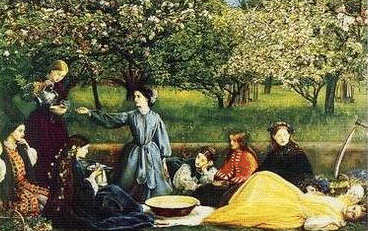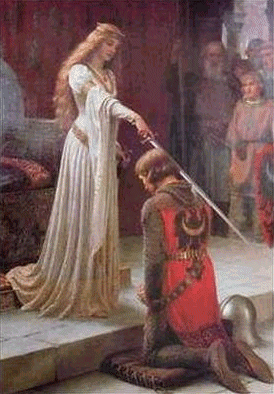(This page is graphic intense and may take a few moments to load.)
Rules of Perspective
There are six basic rules of perspective. Atmospheric, Size, Placement, Detail, Linear, and Overlapping. Drawings and paintings will use some or all of these rules. For this lesson we will create a simple graphic to demonstrate each rule using Paint Shop Pro.
To learn more about the artists below or visit their website, click on their name below the painting.
Follow these links to each rule on this page. Click on the term to return to this table.
To learn more about each rule, follow the links at the bottom of this page
This site is still under construction. Please be patient as the links become available.

The Sierra Nevada in California
Moisture in the air causes distant objects to appear bluish or hazy. This can also happen when there is smoke, dust, smog or other such particles in the air.

The Olive Trees
by Vincent Van Gogh
Distant objects will appear smaller. Artist will draw objects that are similar in size smaller if they are to be placed further in the background of a painting.

Apple Blossom
by John Millais
Objects that are further away are closer to the horizon line. Artists will draw or paint objects higher on the page. If it is something above the horizon line, such as birds, the objects are placed lower.

Accolade
by Edmund Leighton
Less detail is seen in distant objects. Textures are not as defined. You will notice in this painting that the faces of the figures in the background are not as clear. The fabric of their clothing is not as detailed as the figures in the foreground.

Reflections at Twilight
by Carl Valente
Artists will use linear perspective to construct buildings. This involves using guidelines to vanishing points placed on the horizon line to determine the angles to be used. They might also use it to gage the height and angle of a fence or define an estimated width and angle of a river.

Dreams
by Peggy Abrams
Objects in the foreground usually cover up those that are further away. We call this overlapping. You might see a house covering up part of a tree behind it or a person standing in front of a car.
| BACK | HOME | NEXT |
| Fintragh's Homepage | Art Smart | Links & Feedback |
| Properties of Design | Art History | Lessons & Activities |
| Educational Links | ********** | Tidbits |
| Elements | Principles | Subject Matter |
| Content | Style | Techniques |
| Media | ********** | Properties Metasite |
| Color | Line | Shape |
| Value | Texture | Form |
| Space | ********** | ********** |
| Atmospheric | Size | Placement |
| Detail | Linear | Overlapping |
| Unit: 6 Perspective | Unit: 7 Perspective | Unit: 8 Perspective |
| 2D Worksheet | PSP Sample | 3D Worksheet |
| 6th Drawing | 7th Painting | 8th Painting |
09/28/01